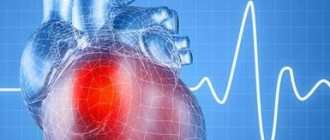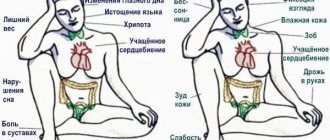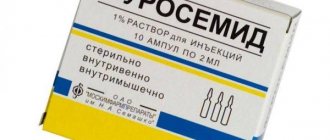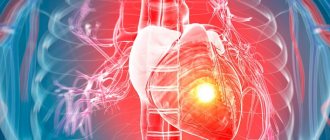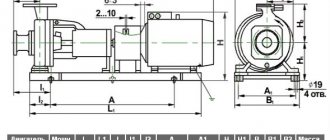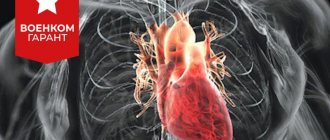Cardiology is a medical science that deals with the prevention, detection, treatment of heart diseases and the circulatory system as a whole. A cardiologist is a doctor who specializes in this area and also works to restore heart function that is impaired due to diseases of other internal organs. The specialist’s task is to promptly detect and eliminate risk factors for cardiovascular pathologies, prevent their occurrence, select the necessary treatment and monitor the condition of patients who have had a heart attack or cardiac surgery.
The history of cardiology goes back hundreds of years. Hippocrates also described the heart as a muscular organ with ventricles and large vessels. And Leonardo da Vinci created many illustrations in which heart valves were clearly visible. If at the beginning of the 19th century doctors were looking for ways to study cardiac and vascular pathologies, now cardiology is aimed at their safe treatment and prevention.
Cardialgia - pain in the heart
Pain due to heart problems is localized both on the left, where the heart is located, and in the center of the sternum.
It can radiate to different parts of the body - into the arms or one hand (usually the left), back to the back and even to the jaw.
Pain develops following physical exertion, after emotional stress, hypothermia, or eating large amounts of food.
The pain can be of a different nature: pressing, cutting, aching, squeezing. She can "bake."
Pain most often accompanies coronary heart disease (CHD) and is called angina. But cardialgia is also characteristic of other cardiovascular pathologies, in particular arterial hypertension, pericarditis, myocarditis, cardiomyopathy, etc.
Pain in the heart area can also be caused by other, non-cardiac pathologies, but it is better if a doctor understands this. Therefore, any cardialgia is a reason to consult a cardiologist.
How is a consultation with a cardiologist carried out?
A consultation with a cardiologist begins with clarifying your complaints. He should ask about the presence of chest pain, episodes of increased blood pressure, and the usual level of blood pressure. The cardiologist's interview includes finding out the facts of heart failure, peripheral edema, bloating, and shortness of breath.
After the interview, the cardiologist examines the patient. An examination by a cardiologist includes an assessment of peripheral edema, counting the respiratory rate, and assessing the pulse. After this, the cardiologist listens to heart sounds with a stethoscope, identifying various changes in normal sounds. Auscultation makes it possible to identify changes in the heart valves and their function. It is also necessary to listen to the lungs, since with heart pathology, changes in the lungs are also possible. Using percussion (tapping) methods, the cardiologist determines the size of the heart. Without fail, the cardiologist measures blood pressure several times. As an additional research method, an ECG can be performed in a cardiologist’s office.
Having examined the patient and established a primary diagnosis, the cardiologist will most likely prescribe additional examinations to clarify the diagnosis. Most often, echocardiography is prescribed on an outpatient basis. To determine heart rhythm disturbances during the day, the patient may be offered Holter ECG monitoring.
Lack of air - shortness of breath
The condition of shortness of breath - difficulty breathing, lack of air - indicates heart or pulmonary failure. Cardiac shortness of breath initially develops with physical effort and goes away when the load stops. But as the disease progresses, shortness of breath can overtake a person, even when he is at rest, and even just lying down. This is already a formidable symptom.
Cardiac dyspnea usually manifests itself as difficulty breathing.
A specialist can distinguish between cardiac and pulmonary shortness of breath. In any case, both symptoms indicate serious health problems.
Treatment of patients
Once the cardiologist knows what the patient's diagnosis is, he must decide which treatment option is best. He may need to refer the patient to cardiovascular surgery for surgery, such as valve replacement. Or he may decide that the patient's condition is best treated with medication. Regular examination is required from time to time.
Therefore, we can conclude that a cardiologist is one of the most important medical professions. Because he is the one who is involved in the diagnosis, treatment and prevention of cardiovascular diseases, which rank first in the world in terms of statistics of all health problems.
More fresh and relevant information about health on our Telegram channel. Subscribe: https://t.me/foodandhealthru
We will be grateful if you use the buttons:
Swelling of the legs
Legs can swell not only with heart disease, but also with kidney problems, varicose veins, and liver damage. Cardiac edema has characteristic features. Such swelling develops gradually, affecting the ankles of both legs, rising to the shins. The skin at the site of swelling is dense, cold (feet often get cold), and has a bluish tint. The swelling is painless, even when pressure is applied to it.
Such swelling, accompanied by other symptoms of heart problems, indicates developing heart failure, so they are the reason for contacting a cardiologist.
All of the above signs, especially if they appear in combination, cannot be ignored. The heart is no joke - myocardial infarction, stroke, cardiac arrest can occur suddenly. To prevent this from happening, you need to promptly contact a cardiologist, undergo an examination, identify the disease and follow all the doctor’s recommendations.
Treatment methods and follow-up
Depending on the identified disease, the doctor applies a specific treatment regimen:
- a diet with a limited menu of fats, simple carbohydrates, and salt;
- moderate physical activity (race walking, swimming, breathing exercises, etc.);
- morning walks in the fresh air;
- compliance with the work and rest schedule (sleep at least 8 hours);
- rejection of bad habits;
- taking medications;
- physiotherapy.
A set of exercises must be developed (each disease has its own exercise plan), which strengthens the heart muscle, increases blood flow and lowers cholesterol levels.
Dynamic monitoring of patients is required for chronic pathologies: coronary artery disease, hypertension, heart rhythm disturbances, heart failure, etc. The frequency of examinations depends on the nature of the lesions. If a patient has suffered a myocardial infarction or heart surgery, he should visit a cardiologist 2-4 times a month for the first 6 months. If the condition is stable, 2-4 consultations per year are sufficient.
At each regular visit, a standard examination is performed with heart sounds, palpation, blood pressure measurement, and a comprehensive examination is prescribed to assess the course of the disease over time. An ECG and a general blood and urine test are required. Based on the results of the examination, the cardiologist adjusts the treatment regimen and sets a date for the next appearance.
Diagnostic methods
To make a diagnosis, a cardiologist uses a number of measures:
- Examination and interview of the patient.
- Listening to the heart with a stethoscope, measuring blood pressure and pulse rate.
- ECG. This is one of the most important methods of examining the heart, indispensable in medical practice.
- Holter, 24-hour blood pressure monitoring.
- MRI, CT.
- Ultrasound examination.
- Stress test and other studies of this type.
- Laboratory diagnostic methods - general and special tests.
Make an appointment with a specialist, without queues, at a convenient time
+7
Sign up
Cardiology
Who is a cardiologist?
A cardiologist deals with problems of the functioning of the cardiovascular system. He diagnoses, treats and prevents diseases of the heart and blood vessels, and develops rehabilitation methods for patients.
Why do patients choose cardiologists at Euromed Clinic?
Our cardiologists are highly qualified specialists who treat each patient “single-handedly.” The same doctor examines you, conducts studies, analyzes them, and prescribes therapy. We profess an individual and attentive approach. In addition, our cardiologists are equipped with the most modern equipment to comprehensively examine your heart and blood vessels.
You can make an appointment with a cardiologist online on the website or by calling the clinic’s 24-hour phone number +.
What diseases do cardiologists at Euromed Clinic treat?
- Congenital and acquired heart defects;
- Ischemic heart damage;
- Heart failure caused by various reasons;
- Angina pectoris, which develops against the background of insufficient blood supply to the heart;
- Damage to the blood vessels and muscles of the heart that occurs against the background of inflammation of one or another area (carditis);
- Arrhythmias, including: bradycardia, tachycardia, partial heart block;
- Aneurysms of the aorta and other arteries;
- Atherosclerosis;
- Heart attacks and pre-infarction conditions;
- Thrombosis and thrombophlebitis.
For what symptoms should you contact a cardiologist?
- Sharp or dull chest pain;
- Prolonged or sudden increase or decrease in heart rate;
- Dyspnea;
- Edema;
- High blood pressure;
- Severe fatigue and weakness;
- Increased sweating;
- Dizziness, fainting and presyncope.
Diagnostic methods of a cardiologist
- Inspection and conversation;
- ECG (electrocardiography);
- Holter 24-hour monitoring;
- Treadmill test;
- Ultrasound of the heart, Dopplerography, echocardiography;
- X-rays;
- Study of lipid metabolism.
How does an appointment with a cardiologist go?
The cardiologist talks with the patient, and pays close attention not only to complaints, but also to a broader context - diet, lifestyle. Further, based on the examination and medical history, as well as after studying previously conducted studies, the cardiologist draws conclusions about possible problems and, if necessary, prescribes additional studies and tests. If the picture is clear, the cardiologist develops a further treatment plan for the patient.
You can make an appointment with a cardiologist online on the website or by calling the clinic’s 24-hour phone number +.
Questions and answers on cardiologists
What are the signs of a pre-infarction condition?
Half of the people experience pain or discomfort in the left half of the chest or upper abdomen within a few days or even weeks, which can radiate to the left half of the neck, lower jaw, or left arm. Angina pectoris may appear, or, if it already existed, angina pectoris at rest; weakness, fatigue, lethargy, shortness of breath are noted. However, sometimes all these signs are absent and a heart attack develops suddenly.
What diet helps maintain normal cholesterol levels?
You should avoid dishes made from fatty meats, sausages, smoked meats and canned food. Also, you should not eat prepared foods containing trans fat (cakes, pastries, many yoghurts and desserts, etc.). On the contrary, you should “lean in” to foods containing potassium, magnesium and calcium: dairy products, fish, buckwheat, millet, potatoes , a variety of vegetables and berries. Fish is extremely healthy, especially fatty fish - mackerel, salmon, tuna, since fish oil contains “good” fatty acids (omega 3). As for alcohol, preference should be given to red wine (in moderation). It is often said that the healthiest cuisine for the heart and blood vessels is Mediterranean, with its olive oil and seafood.
What measures will help keep your heart healthy?
- Quitting smoking and alcohol abuse;
- Weight normalization;
- Physical activity;
- A balanced diet, a cholesterol-lowering diet;
- Regularly taking medications recommended by your cardiologist.
Heart rhythm disturbance - arrhythmia
As a rule, we do not notice how our heart works. But it happens that subjective unpleasant sensations arise - the heart “flutters” (atrial flutter), “freezes,” as if “turns over.” If such sensations are constant, and are also accompanied by other symptoms: shortness of breath, weakness, chest pain, then consultation with a cardiologist is necessary. It is likely that the cause is heart disease - ischemic heart disease (coronary artery disease), cardiomyopathy (changes in the heart muscle, often of unknown cause), pericarditis (inflammation of the pericardium, often associated with the accumulation of fluid in the pericardial cavity), heart disease (a disease associated with anatomical disorders structures of the heart, namely valves, septa, cardiac openings).
Price
Cardiology
| Name of service | Price |
| Consultation with a leading cardiologist, primary | 3 500 ₽ |
| Consultation with a leading cardiologist, repeated | 2 500 ₽ |
| ECG reading with interpretation | 1 200 ₽ |
| ECG reading | 600 ₽ |
| ECG interpretation | 600 ₽ |
| ECHO-KG | 2 900 ₽ |
| 24-hour Holter ECG monitoring | 3 500 ₽ |
Advantages
- The latest, constantly updated equipment
- Interest-free installments for all services
- Online consultations with an ENT doctor
- Visit of an ENT doctor to your home
- Friendly and qualified staff
- 24/7 ENT assistance
Cardiology is a branch of medicine that studies diseases of the heart and blood vessels. All over the world, cardiac diseases occupy one of the first places in terms of the number of patients. It is these diseases that cause loss of ability to work and a decrease in the quality of life for the vast majority of residents of developed countries.
Treatment alone is not enough to improve the situation. The patient must modify his lifestyle in order to minimize the negative impact of the main risk factors, namely overweight, smoking, and low physical activity.
The clinic’s doctors give comprehensive recommendations to patients. Advice is individual in nature and takes into account the specifics of each person’s situation. As part of complex therapy, the most effective drugs with a high safety profile are selected.
What does a cardiologist treat?
A cardiologist is referred if the patient is suspected or has already been diagnosed with the following diseases:
- heart defect (congenital or acquired);
- ischemic disease;
- myocarditis;
- arrhythmia;
- heart attack;
- endocarditis;
- cardiomyopathy;
- rheumatism of the heart;
- angina pectoris.
Consultation with a cardiologist is also necessary in the treatment of pathologies that are at the border of several medical areas. We are talking about renal hypertension, mediastinal tumors, infectious myocarditis, pulmonary embolism, renal hypertension, autoimmune diseases.
A cardiologist treats patients from early childhood to old age. The main age group is mature and elderly patients.
Anaprilin
- Has a hypotensive effect, reduces heart rate;
- Increases the resistance of the heart muscle to oxygen starvation;
- Prevents the development of arrhythmia.
More details
THERE ARE CONTRAINDICATIONS. BEFORE USE, READ THE INSTRUCTIONS CAREFULLY OR CONSULT A DOCTOR
Department of Cardiology at Clinic No. 1
Cardiology deals with the study, diagnosis and treatment of diseases of the cardiovascular system. The section covers the heart, blood vessels, their functions, causes of diseases, and their clinical manifestations. Cardiology studies the mechanisms of disease occurrence and develops effective methods for their timely detection and treatment. One of the most important areas of activity of cardiologists is solving the problem of rehabilitation of patients whose cardiovascular system is affected by diseases.


